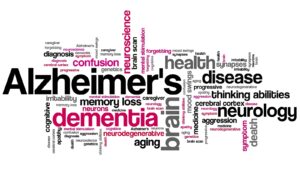Mom Was Diagnosed With Alzheimer’s: What Happens Now?
With 6.5 million cases of Alzheimer’s in the U.S., most people know someone with this disease. When it’s your own parent, moments of disbelief blend with the uncertainty of what lies ahead. Now that your mom has been diagnosed with Alzheimer’s disease, what happens next?
The Early Stages

24-Hour Home Care East Grand Rapids, MI: Seniors and Alzheimer’s Care
In the early stages of Alzheimer’s, you may not notice much has changed about your mom. Her memory is definitely worsening, but she’s still conversing with you and can tell you what she needs.
Her doctor may start cautioning her against driving. If she isn’t supposed to drive, you need to make sure someone is stopping by to take her shopping and bring her to appointments. Medication reminders are important at this point as she may not always remember to take her pills.
The Middle Stages
If you have not arranged Alzheimer’s care yet, it’s past time. Your mom may struggle as her recollection of faces and names is going. She’s not going to adapt quickly, so every time her caregiver arrives, she may become confused, agitated, and aggressive.
Cues are important at this point. Your mom may not realize what season it is. She’ll pick the wrong clothing for the weather. She might use the wrong skincare products, which can be risky.
In the middle stages, your mom’s depth perception may start changing. She trips stepping over curbs or up and down the stairs. She may start finding it hard to step over the edge of her bathtub.
It helps to have Alzheimer’s care set up in the early stages of the disease. Not only can your mom take time to get to know her caregiver, but her caregiver also has time to get to know what she likes, what she doesn’t, and what her temperament’s like.
The Late Stages
By the late stages of Alzheimer’s, your mom may not talk much. If she does, she babbles. Her words may be made-up nonsense, but moments of clarity may arise and give you a word or two that you understand.
In the final months and weeks, mobility changes. Your mom is going to need someone to help her move around, and she’s likely going to be in a wheelchair. If she tries to stand, she’s going to fall, so she has to have support in the shower and when moving from a bed to a wheelchair.
Your mom won’t be able to feed herself. She needs a caregiver to help her eat, and don’t be surprised if she only has nutritional shakes and refuses any solid foods. At this point, make sure you’re taking care of yourself and letting aides handle the majority of your mom’s care.
Talk to an Alzheimer’s care specialist to learn more about the prices and ways to make your mom as comfortable as possible as she progresses through the stage.
If you or someone you know needs help with 24-Hour Home Care in East Grand Rapids, MI, contact Gauthier Family Home Care. We provide quality and affordable home care services in our community. Call us at (616) 258-2300 for more information.
- Alzheimer’s Care Helps Family Caregivers Take Holiday Breaks - October 23, 2024
- 5 Foods Seniors With Diabetes Should Be Eating More Of - October 15, 2024
- Why Emotional Support Matters in Post-Hospital Care - October 11, 2024
